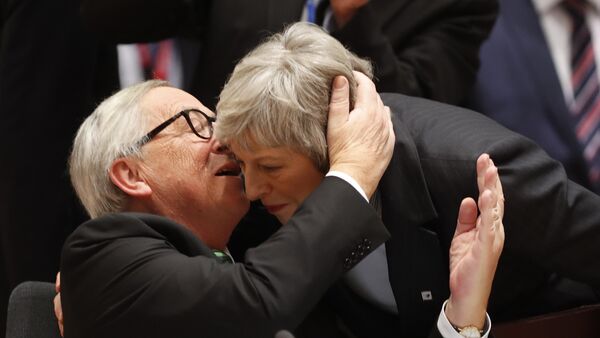Sputnik: Will the EU agree to an extension to Article Fifty, and would this be beneficial in any way?
Marcus Stead: I think it’s worth reminding ourselves of what happened when Theresa May asked for a previous extension last month, and her preferred extension was until June, but what she actually got from the EU was an extension until 21 May if its purpose was to allow time for her to implement her deal, once it had gone through parliament by the 29th of March, or the 12th of April, namely this coming Friday, if she failed to get her deal through the House of Commons, in which case we were to live with no deal.
One thing Theresa May hasn’t been clear about is what she’s trying to achieve. If the EU leaders are expecting clarity from Mrs May at their meetings today they are going to be in for a disappointment.
READ MORE: Corbyn Would Become PM This Year if UK Held General Election — Commentator
All twenty seven EU member states need to agree, and I do think that an extension is likely to be offered; but there may well be certain strings attached, and today is not going to be plain sailing by any means.
Theresa May spent the latter part of last week holding talks with the leader of the opposition; Jeremy Corbyn, to try and find a way forward but nothing much seems to have come from those talks, and the apparent concessions that she is rumoured to be offering to Mr Corbyn appear to be annoying her allies in the DUP, whose ten appears in parliament are propping up the Conservative government.
At the same time; a long extension contains certain risks, and by that I mean if there is any prospect at all of the UK still being in the EU beyond June the 30th, the UK will legally have to take part in the European Parliamentary elections.
If that happened; it’s very likely indeed that pro-Brexit parties would do very well and that would be hugely embarrassing for the EU, and indeed for the entire political establishment in the UK. On top of that there does seem to be a growing body within the EU, who are saying that the whole Brexit process is taking up too much time and all other EU priorities seem to be on the back burner as a result.
Sputnik: How could British politics change after the Brexit debacle?
Marcus Stead: Based on what we’ve seen in the past few weeks, whatever happens with Brexit from here on in it’s not going to be the end of the story. I think this is the end of the beginning, and lots of things have happened in the last few weeks and months that will have far reaching consequences well beyond Brexit.
We witnessed last week how Yvette Cooper’s bill to compel Theresa May to ask for this extension to Article Fifty have three readings in the House of Commons on a single day, and for those who aren’t familiar with how things work in Britain; we do not have a written constitution, our whole parliamentary system works on the basis of precedent and convention, and it’s very unusual indeed for a bill to be pushed through the House of Commons on a single day.
The speaker of the House of Commons, John Bercow, has done significant damage to the office of the speaker through numerous actions in recent months, and beyond that the party whipping system in the House of Commons seems to have broken down completely.
READ MORE: 2.4m EU Nationals Under Threat From Vague Right to Buy Rules After Brexit — RLA
These sorts of conventions are like trees, it takes years to grow and flourish, and yet with one act of vandalism it can be completely destroyed.
As for Yvette Cooper herself; her seat voted leave in the 2016 referendum, and at the 2017 general election, her leaflets promised to implement the result of Brexit, and her voters won’t forget that.
All these factors mean that we are likely to see a radical realignment of British politics in the next five to ten years, and Brexit is just the first act of that process.
The views and opinions expressed in this article are solely those of the speaker and do not necessarily reflect Sputnik's position.




